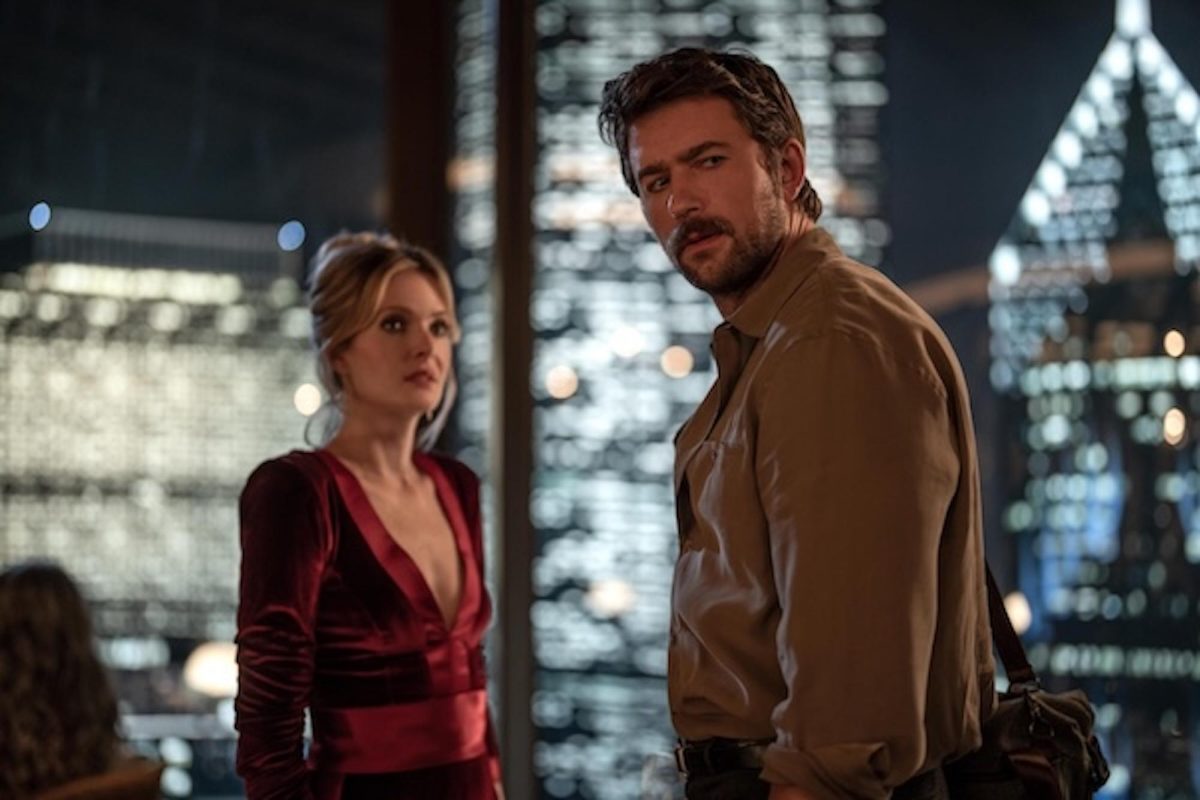“Drop” arrives with a premise tailor-made for our digitally anxious age: a bootleg AirDrop app called DigiDrop that allows anonymous users to send messages — first playful, then sinister — to strangers. It’s the kind of modern tech conceit that feels believable and terrifying, especially in an era where digital intrusion is a daily reality. But what should have been a sleek, unsettling thriller is an oddly lifeless viewing experience. Despite its promising setup, “Drop” never quite delivers on its tension, ultimately becoming a cautionary tale about wasted script potential rather than digital overreach.
The film opens with Violet (Meghann Fahy), a recently widowed mother, trying to ease back into the dating scene. Her first DigiDrop comes during an already uncomfortable dinner in what’s supposed to be a trendy Chicago restaurant, yet the setting looks like a nondescript space borrowed from a corporate brochure — and for a good reason. Although set in Chicago, “Drop” was filmed in Ireland. The lack of authenticity in the backdrops is more than a visual nitpick — it’s a symptom of a larger problem. This film fails to create a believable world, a key shortcoming in a genre that depends on immersion and atmosphere.
Director Christopher Landon is no stranger to genre-bending thrillers, and his ability to juggle horror with humor and heart is well-documented, as seen in his previous works “Happy Death Day” and “Freaky.” But here, he seems uncertain of the tone he wants to strike. The DigiDrops escalate from unsettling to dangerous, but they’re delivered with the narrative urgency of an email notification. There’s little sense of mounting dread, no crescendo of paranoia. The tension flatlines early, and instead of intensifying, the film meanders through its central premise.
The story’s emotional core is Violet’s relationship with her young son, who becomes the ultimate leverage for the DigiDrop antagonist. Yet, even as the child is threatened, the film struggles to generate genuine fear. These scenes — designed to be heart-pounding — feel contrived and implausible. The violence feels artificial to the point of absurdity, and the film never convinces the audience that Violet and her son are in real danger. The stakes are hollow, which undercuts any investment in their outcome.
Fahy, known for her emotionally nuanced work in “The White Lotus,” delivers an oddly muted performance. She plays Violet with a kind of distant restraint, which could have worked as a slow-burning descent into paranoia — if only “Drop” gave her more to work with. Instead, her character often feels like she’s reacting to events from a few scenes behind. Her emotional state rarely matches the gravity of her circumstances, resulting in a lead performance that feels curiously disengaged. Violet’s date-turned-sidekick, Henry (Brandon Sklenar), brings little spark to the table, similar to his stale performance in “It Ends With Us.”
Visually, “Drop” is as subdued as its lead. The desaturated color palette and generic urban landscapes feel more like a placeholder. Scenes that should be claustrophobic or visually jarring — like an anonymous digital ambush or a high-stakes confrontation — are filmed with a puzzling lack of energy.
By the time “Drop” hints at a broader conspiracy, suggesting that DigiDrops is just the surface of a darker digital ecosystem, it’s far too late. These revelations feel half-hearted and undercooked, tacked on rather than embedded in the narrative’s DNA. There’s no real thematic follow-through on the dangers of anonymity, no deep dive into the moral ambiguity of compliance versus rebellion and no commentary on how digital culture erodes our sense of agency. In short, the film has much to say but never decides how to say it.
The ultimate frustration with “Drop” is that it had the potential to be a sharp, socially relevant thriller. With an accomplished director, a strong lead actor and a concept that directly addresses contemporary issues, it could have offered a pointed critique of our obsession with technology or a compelling character study wrapped in digital anxiety. Instead, the film opts for surface-level thrills and a stagnant narrative. The result is not a catastrophic failure but rather a disappointment that fizzles out and is forgotten before the credits finish rolling.
Contact Chloe Haack at [email protected].
























































































































































